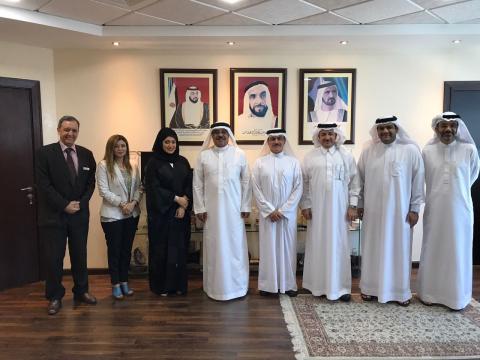
The meeting aimed to support the transplantation program in the UAE, following the decree of Union Law No. 5 of 2016
Dr. Amin Hussein Al Amiri, Assistant Undersecretary of the UAE Ministry of Health and Prevention's (MOHAP) Public Health Policy and Licensing, received a high-level delegation from the Saudi Centre for Organ Transplantation led by Dr. Faissal A.M. Shaheen, Director General, Saudi Center for Organ Transplantation. Dr. Shaheen was accompanied by Hassan Abdullah Al Khanani, Administrative Coordination, Saudi Center for Organ Transplantation. The meeting also witnessed the attendance of Dr. Amer Ahmed Sharif, CEO of Dubai Healthcare City Authority (DHCA)- Education Sector, and Professor Alawi Al Sheikh, Dean at College of Medicine - Mohammed Bin Rashid University of Medicine and Health Sciences. The meeting focused on the prospects of cooperation, and enhancing cooperation in the UAE.
Evaluating governmental and private centers interested in entering the transplant program
Dr. Al Amiri emphasized the importance of the meeting, which aims to supports the transplantation program in the UAE, following the decree of federal Law No. 5 of 2016, to regulate the transfer and transplantations of organs and human tissue, and the Ministerial decree 550 of 2017, on the standards of diagnosing death. The Saudi Center for Organ Transplantation, in cooperation with the National Organ Donation Committee, agreed to evaluate private and governmental centers interested in entering the organ transplantation program. The Saudi Center for Organ Transplantation will also support the evaluation of the readiness of private and government centers, according to the highest international standards, while developing framework for registering patients in need of organ transplantations.
Saudi Center for Organ Transplantation, established in 2006, is reference for GCC.
Dr. Al Amiri noted that the cooperation between the two sides will contribute to saving the lives of hundreds of patients, including patients with liver cirrhosis, kidney failure, and corneal and pancreatic diseases. The meeting highlights the importance of raising community awareness to increase the number of organ donors, while highlighting opportunity to benefit from the experiences of the Saudi Center for Organ Transplantation which was established in 2006 and became a reference for the GCC countries.
A guide and electronic linking between organ transplantation centers
Dr. Al Amiri explained that the UAE has all the elements required to successfully transplant organs, in addition to highly qualified staff and health facilities with international accreditation. Specialized teams are working to develop framework for organ transplantation procedures, in adherence with the GCC Standard List, to build an electronic network among transplant centers in the GCC, and to include the information regarding willingness to donate organs on the driver license and other ID. in addition to increasing the abilities of medical staff, while encouraging further research in the field of organ transplantation.
Categories
- Log in to post comments
